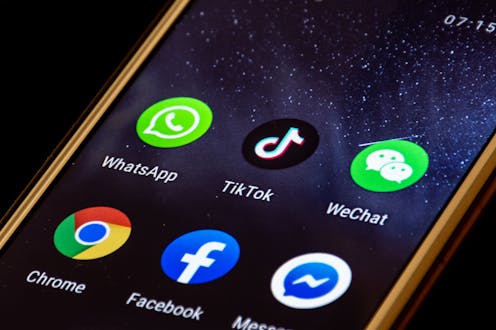How can we stop fake election news spreading in migrant communities?
- Written by Wilfred Yang Wang, Lecturer in Media & Communications Studies, The University of Melbourne

Concerns about fake news and misinformation spreading on social media among Chinese communities are once again emerging, as they were during the 2019 election campaign.
There have been allegations against both major parties in recent weeks. The ABC reported a group of Liberal Party supporters systematically spread fake news about prominent Labor supporters in the Chinese community via WeChat.
At the same time, a local Labor branch in Queensland is accused of spreading a conspiracy meme against Gladys Liu, the incumbent Liberal candidate of the ultra-marginal Victorian seat of Chisholm and the first ethnic Chinese woman to serve in the House of Representatives.
Liu’s supporters are also not free from controversy. Some were accused of spreading misinformation in Chinese communities during the last federal election.
Drawing on my research on Chinese language media and Chinese communities in Australia, here are are some ways we can tackle fake news in non-English speaking communities.
Fake news and CALD Australians
Fake news is often systematically arranged by interest groups (such as political organisations) to achieve certain goals. This contradicts the popular assumption it’s fragmented or emerges spontaneously.
While every section of the society is subjected to fake news, culturally and linguistically diverse (CALD) communities are often more vulnerable to misinformation.
Read more: Here's how disinformation could disrupt the Australian election
It is widely acknowledged mainstream media outlets don’t do a good job of representing or communicating with CALD communities.
We know CALD communities often seek online and informal sources for information – as they did during COVID.
The information gap
Poor English skills can also make it hard for some non-English speakers to access credible authority sources directly.
Even when media outlets translate certain articles, they can lack the nuance to convey critical details.
My as yet unpublished research suggests many Chinese Australians who cannot understand English haven’t been accessing public health messages from government or health authorities during the COVID pandemic.
Instead, they tend to rely on community leaders, friends and family members to make sense of important public messaging, via apps like WhatsApp and WeChat.
This aligns with previous findings that Chinese Australians trust political news on Chinese platforms such as WeChat not because of the platform itself, but because of the people from the similar cultural and linguistic communities they share the platform with.
My research
In my as yet unpublished research, only two of 31 older Chinese Australians I interviewed read English mainstream Australians news daily. The vast majority obtained most of their news about COVID from instant messenger groups, social media platforms such as WeChat, and from sources outside Australia.
None of the participants were aware of the Chinese language version of ABC news. Only around half of the interviewees knew about the SBS Mandarin and Cantonese services, but none were aware of their social media accounts and smartphone apps.
The participants’ feedback shows the failure of mainstream media to engage non-English speaking CALD Australians. This can create a breeding ground for the spread of misinformation, which can potentially distort voters’ decisions and influence election outcomes.
What can we do?
There are several things governments should do in collaboration with communities to help CALD Australians gain direct access to credible news and to become more aware of misinformation.
Promote the ABC and SBS
Both federal and state governments should promote ABC and SBS in-language news, such as SBS Mandarin, especially during important public conversations such as pandemic management and elections.
A good example is SBS’s COVID myth buster portal, which is available in more than 60 languages. This collates culturally appropriate news and information to help CALD communities stay informed about COVID, and serves as a good model for other important topics and events such as an election.
Promoting the ABC and SBS requires a strategic approach. Instead of governments running a mass campaign, which can be costly and ineffective, a better approach would be to co-develop resources and information with the language teams of the respective services. These resources can then be promoted to community leaders for them to disseminate to their communities.
More resources and training should be devoted to support journalists’ cultural literacy.
Digital literacy training
Federal and state governments do fund digital literacy initiatives, such as BeConnected.
But typically these don’t have specific resources and training to support CALD communities.
They’re often too general and lack systematic programs to help CALD Australians learn how to download, operate, and access credible news and information and to improve their political literacy.
Read more: Chinese social media platform WeChat could be a key battleground in the federal election
Tackling fake news in CALD communities requires partnerships between governments, community groups and media organisations.
There should be a particular focus on digital literacy of community leaders.
And more resources should be devoted to improve journalists’ cultural competence in communicating with CALD Australians.
Authors: Wilfred Yang Wang, Lecturer in Media & Communications Studies, The University of Melbourne



















